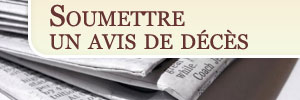
Jerauld Wright
Lieu de naissance : Liverpool
Lieu de décès : Ottawa, Ontario, Canada
Jerauld George Wright, a proud son of Liverpool, passed away peacefully twelve days after his 99th birthday with family at his side, at the Perley Rideau Veterans' Health Centre in Ottawa, Ontario. He was predeceased by his wife Elma, his only sibling Mary Knox, his older son Ian, and his younger daughter Alison Chenosky. He is survived by his daughter Kirsty /Christine (LouisTousignant), son Robert, daughters-in law Odette Daigle and Carlita Delion , son-in-law Mark Chenosky, grandchilden Liz and Davey Wright , and Tyler, Meaghan , and Nick Chenosky , and nephews Steven Knox ( Carol ) and Jeffrey Knox.
Jerauld was born in Liverpool Nova Scotia to Edgar and Jessie (West) Wright. He was (in Armand Wiggleworth's words in The Advance) ‘a brilliant student at the old Liverpool Academy’. He was also a gifted musician, playing piano and organ, who had dreams of a career in music. A ten-month course in pharmacy at King's College was to remain his only formal post-secondary education. In his teens and early twenties he worked at Seldon' Pharmacy (with his lifelong friend Doug Hemeon) and also helped with his father's funeral home, later Wright and Chandler.
World War II opened new horizons. Jerauld joined the RCAF early in 1940, and was in the second shipment of recruits to be sent to the UK. Most young aviators, including Jerauld, wanted to be pilots, but he volunteered to train as a navigator, because they were more urgently needed. This was a life-changing decision. He was an outstanding navigator, and was soon flying missions of high importance and even higher high risk. The most notable of these was his navigation of a flight assessing the feasibility of a northern supply route to Arkangelsk (in the then-USSR) via Spitzbergen; for this he was awarded the Distinguished Flying Cross. He was in active overseas service over the North Atlantic in convoy escort and in India, flying over Burma, in addition to other special missions, in both these combat arenas until 1945.
Jerauld met his Scottish wife in 1942 while recovering from an injury incurred during a North Atlantic flight; they married in 1942, and endured long separations until they began their post-war life in Canada in 1946.
During his time in India, Jerauld had begun to think about ways to make navigation less people-dependent and more efficient in the increasingly fast aircraft then being developed. He had begun original and useable work on navigation in Burma, for which he was mentioned in Despatches, but his breakthrough ideas came to fruition with the invention and patenting of the R Theta air navigation computer, whose operational development with Computing Devices Canada was funded by the federal government. This work won Jerauld widespread recognition at the time, and is still well known in the air-navy circles. Jerauld was awarded the McGee Trophy in 1954. He was also promoted to Wing Commander that year. He worked on various subsequent generations of computers, including the ANTAC system and other use in all NATO air forces, and eventually held over thirty patents for navigational devices. This work contributed to his later admission to the Canadian Aviation Hall of Fame, and to the Canadian Aeronautical Institute, and many other awards.
Jerauld retired from the RCAF in 1965, and worked for many years as a retained consultant with various large firms, while also pursuing his own projects. He always identified himself as an inventor above all; and like all inventors he loved all his inventions and thought that all his geese were swans. Old friends and family will remember with fondness but mixed feelings such products as J Stix and the Wright Wonderbed, but for Jerauld the fun was always in solving the puzzle, working out an original way to look at and solve problems.
Jerauld was a man of immense charm; he had a great sense of audience and enjoyed amusing people. His love of music endured lifelong; he always had a piano and played the organ at every church he attended over the years. He was happy improvising at the keyboard for hours, and leading singalongs – he could pick up any melody in a few seconds on a piano or on one of his accordions.
Jerauld was also a man of deep religious faith, which was both childlike and deeply considered; he believed that the advances in science during his lifetime, which he had the mind to understand, showed that science and mystery interpenetrate in ways beyond human comprehension.
Jerauld attracted affection lifelong with his good humour and enjoyment of life. This was true in his last chapter, which despite the progression of Alzheimer's was a happy. Even as his Jerauld's brilliant mind and his physical energy faded, he continued to take pleasure in small things, enjoying each day as it came, with his charm and sense of humour and fun enduring almost to the end.
Jerauld never forgot Liverpool, and for many years had a summer home for his family close to his parents' home on McPherson Street.
As he wished, Jerauld's ashes and those of his wife will be interred in the family plot in Liverpool.







